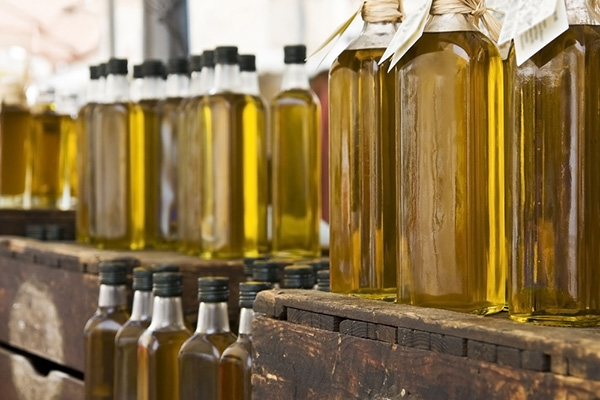What's Really in your Olive Oil Bottle?
 Olive oil image via Shutterstock
Olive oil image via Shutterstock
Olive oil is rich in flavor, and research suggests it’s great for your health. Olive oil contains essential fatty acids, monounsaturated fats, vitamin E, and phenolics, which are plant-based compounds that have anti-inflammatory and anti-clotting qualities. Replacing saturated fats, like those found in butter, with monounsaturated fats (the type of fat predominant in olive oil) may lower cholesterol levels and protect the heart.
The world consumes almost 3 million tons of olive oil annually and the demand for this heart-healthy oil continues to rise. But not all olive oil is the same. Approximately 700 varieties of olive oil are on the market, and they vary in flavor and quality depending on a wide range of factors like price, acidity level from age, region of growth, production date, and production methods.
Unfortunately, olive oil production is poorly regulated and labeling laws are nearly non-existent, resulting in low-quality—and sometimes even non-olive oils—being passed off as extra virgin olive oil. Real extra-virgin olive oil has a green coloring and distinct flavor, but, sometimes, low-grade soybean oil, canola oil, and even olive oil produced from rancid olives, are masked through coloring with industrial chlorophyll and flavor-altered with beta-carotene. Fraudulent practices result in a significant reduction of health benefits while making it difficult for honest olive oil producers to compete in the marketplace. “Lately the olive oil industry has been struggling with a wrenching crisis brought on by mass-market price wars and a flood of low quality olive oil—a lot of it falsely labeled extra virgin,” wrote Curtis Cord, the executive editor of The Olive Oil Times.
Most olive oil frauds are easy to detect through chemical processes, but how does the average consumer find the real deal? In his book, Extra Virginity: The Sublime and Scandalous World of Olive Oil, Tom Mueller suggests a variety of ways that consumers can find good quality olive oil. Here are 10 of his suggestions:
1. Find a store where you can taste the olive oil and where the staff can answer a few basic questions about where and how the olive oil was made. A local favorite, Gustare Oils and Vinegars, with locations in Chatham, Mashpee, and Wellesley, has a tasting room where the staff will guide you through their wide variety of oils, including some interesting, new innovations like olive oil infused with blood orange or chipotle.
2. Be mindful of the olive oil’s age. Unlike some wines, olive oil does not improve with age. It should be consumed within twelve months of the bottling date.
3. Choose olive oil in dark containers. Olive oil will get rancid quicker when exposed to light.
4. Don’t worry too much about color. Olive oil comes in a variety of colors depending on the type of olives used and other variables.
5. Read the label! The olive oil should be labeled “extra-virgin” not “pure” or “light” oil. Also, beware of a label that says simply, “olive oil” because it has likely undergone chemical refinement, which strips away the flavor and most of the health benefits.
6. The oil’s acidity matters. Good oil will often have a FFA (free fatty acidity) measurement of 0.2 percent or lower.
7. Choose organic olive oils when possible.
8. Purchase olive oils that are certified by national and state olive oil associations such as the Australian Olive Association, the California Olive Oil Council, and the Association 3E. The North American Olive Association and the International Olive Council also have certification programs.
9. Terms such as “cold pressed” and “first pressed” are more marketing terms than meaningful labels in modern olive oil production. Most olive oils are now made with centrifuges and not pressed at all.
10. Unfiltered versus filtered oil is a matter of personal flavor preference, but watch for unfiltered varieties that have a layer of sediment on the bottom. The sediment will go rancid quicker than the oil itself.
In addition to Gustare Oils and Vinegars mentioned above, several other Boston-area specialty stores provide healthy, flavorful options:
Boasting a unique tasting bar that uses stainless steel fusti tanks (stainless steel drums) from Italy to preserve flavor and freshness, Boston Olive Oil Company has a wide variety of oils in its store on Newbury Street.
Also on Newbury Street, Mediterranean food merchant, O & Co. as a wide selection of real, extra virgin olive oil.
Whole Foods also has a nice selection of olive oils and says their 365 brand extra virgin olive oil is certified by the North American Olive Association.


